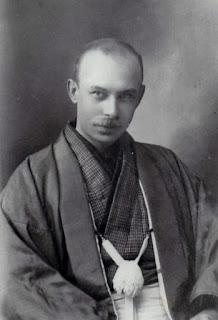A family history ( 1 ) Life at the Hiroshima Atomic Bomb Dome
My maternal grandmother was from Hiroshima prefecture, Japan. Most of her family lived in Horshima, but I have not heard much about them until I was 17 years old. This is some of the family history I heard, when I visited my grandparents back in 1989.
My grandmother’s father was working at the Hiroshima
Prefectural Industrial Promotion Hall – better known as “Atomic Bomb Dome”. As the name of the building
describes, the hall exhibited many industrial products in Hiroshima – I heard
that the dome had a beautiful spiral staircase leading up to upstairs. My
great-grandfather’s office was in the building.
My great-grandfather was known affectionately by the family
as “the man who forgets”. He always forget something. It caused many mayhems,
but everybody knew his personality.
So on 6th August 1945, when Enola Gay was heading
to Hiroshima carrying the little boy, my grandfather arrived at his office. As
usual, he noticed he forgot something at home. He jumped back on a tram and
headed home. By the time he got home in the outskirt of Hiroshima, the little
boy ripped the whole town. My grand-parents were safe.
Their sons, my grandmother’s brothers were affected by the
bomb. They were in the centre of Hiroshima back then. One of them suffered
life-long severe depression, one of the effect by the A-bomb. My grandmother was already married and lived
near the Mount Fuji, chasing my uncle and carrying my mother who was newly –born
baby. She was also safe.
I visited Hiroshima in 1989 with my parents. They took me to
the A-bomb dome and the museum. I learned about the history. Some of the old photograph
showed the original building before it was destroyed. It was indeed a beautiful
building.
The building was designed by a Czech architect called Jan Letzel.
The architect came to Japan at when he was young, and said to have worked
mostly in Japan.
It is a bit of shame
that we can’t see his original creation anymore. The dome is wrecked now. Personally
I prefer to memorize the original building, where my great-grand father worked.
Coincidentally, one of my friend from Hiroshima had a grandmother who taught tea ceremony and flower arrangement at the A-bomb dome. We chatted about it, and wondered if our grandparents knew each other.
After visiting my grandparents in Sizuoka, my parents took me to visit
our relatives in Hiroshima. My parents had great catch ups. It was first time for
me to meet these distant relatives, and it was quite fun to hear their stories.
Somehow, they spoke about the war-time experience, which I have never heard before.
Some of them mentioned that they can now talk about the war-time
experience, since the Emperor Showa passed away earlier on that year. Elders
kept their war-time memories to themselves, because they knew everybody just did
their jobs including the Emperor Hirohito. They just didn’t feel like talking
about it in front of younger generation, while the Emperor Hirohito was alive –
they just could not talk about war-time experience as if to talk behind the
Emperor’s back.
I hope we will never repeat this war-time experience on this earth, let alone the use of A-bomb anywhere in this world. Not only it kills people, it gives life-long suffering effects, which leaves people literally dead even though they are technically alive.





Comments
Post a Comment